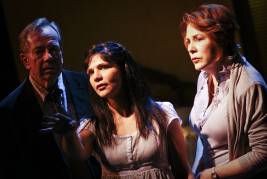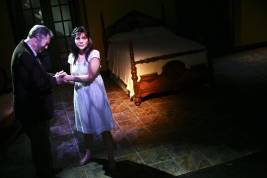
A young man disappears, and five years later remains missing with nary a clue of his possible whereabouts.
JT Rogers’ Madagascar looks at the effect of this disappearance on three of the people closest to him. Densely written, told almost entirely through monologs, Madagascar is a smart play that requires smarts from its audience.
Fortunately, its superb staging by The Road Theatre Company makes Madagascar an accessible, compelling theatrical adventure. Brendon Fox’s direction and performances by Road Co-Artistic Directors Sam Anderson and Taylor Gilbert and Road member Deana Barone are awesome indeed.
Madagascar is not a play to go into clueless, though, so here’s a bit of pre-show prep that should go a long way towards making Rogers’ thought-provoking drama the richly rewarding experience that it can be.
As previously stated, the roles of June (Barone), Lilian (Gilbert), and Nathan (Anderson) are written almost entirely as monologs spoken to the audience. Though each character’s soliloquies are delivered more or less in that character’s chronological order (and all in the same hotel room overlooking Rome’s Spanish Steps), each takes place in a different time period. Lillian is speaking to us from five years ago, just before the young man’s disappearance. June is (significantly) speaking from a few days ago. Only Nathan is talking to us in the here and now. Lillian and June are mother and daughter, and Nathan is a close family friend, a colleague of Lillian’s deceased husband, and …. One more thing. Gideon and Paul are the same person.
This review will give away nothing more of Madagascar’s plot (yes, there is indeed a plot). Consider the first act and its many riddles the investment, and the second act, with its many dramatic revelations, the payoff, and you will have one powerful theatrical experience.
Anderson, recent recipient of the L.A. Drama Critics’ Circle Award as Best Actor for his performance in the title role in The Bird And Mr. Banks (that’s Mr. Banks, not the bird), does bravura work as a man tortured by guilt, his nightmarish opening monolog revealing the depth of culpability he feels about the events which Madagascar reveals like onion skins peeled away one by one.
The ever luminous Gilbert is simply and subtly stupendous in her work here. Though Lillian is the only character who does not yet know of the aforementioned disappearance, she is already well aware of its central cause. Thus Gilbert’s performance blends hopefulness and guilt in equal measure. It’s hard to imagine a better choice to play Lillian, a woman whose actions could make her the villainess of the piece in less innately sympathetic hands.
Barone more than holds her own opposite her more seasoned costars. From the fire she brings to her opening monolog to the innocent joy which marks the one which ends the play, Barone’s work is thrilling and heartbreaking in equal measure.
Those who fear that a play built around monologs might prove monotonous or uninvolving need fear not. Each actor (Anderson and Gilbert in particular) undertakes numerous cameo roles—tourists, relief workers, passengers, etc., interjected into the monologs at appropriate moments. In addition to adding variety to the proceedings, the multiple roles provide the performers with acting challenges which they surmount with aplomb.
Fox’s staging could not be more imaginative or visually striking, particularly in the way he uses his two supporting actors during each lead actor’s monologs, aided and abetted by Christian Epps’ gorgeous, complex, ever-changing lighting patterns. (There were a few opening night lighting glitches, understandably.)
Helen Harwell’s elegant set design, Holly Poe Durbin’s perfectly designed costumes (note June’s nightgown and bare feet), and David B. Marling’s emotionally evocative sound design complete an outstanding design package. Thumbs up too to Marc Rosenthal’s video design and Linda de Vries’ dialect coaching. Maurie Gonzalez is stage manager.
There will be those, I’m sure, whose response to Madagascar is “I don’t get it,” though hopefully not among those who’ve read this review in advance. The vast majority will, I believe, figure out what Rogers is going for. Yes, Madagascar could have been told in linear form, with characters talking to each other rather than to the audience. Would that have made a better play? I’ll leave it up to audience members to decide. For this reviewer at least, the concept works, and the end result is intelligent, compelling theater in a production which I predict will inspire repeat visits, and deservedly so.
The Road Theatre, 5108 Lankershim Bl., North Hollywood.
www.roadtheatre.org
–Steven Stanley
May 22, 2010
Photos: Chris Goss





 Since 2007, Steven Stanley's StageSceneLA.com has spotlighted the best in Southern California theater via reviews, interviews, and its annual StageSceneLA Scenies.
Since 2007, Steven Stanley's StageSceneLA.com has spotlighted the best in Southern California theater via reviews, interviews, and its annual StageSceneLA Scenies.







 COPYRIGHT 2024 STEVEN STANLEY :: DESIGN BY
COPYRIGHT 2024 STEVEN STANLEY :: DESIGN BY